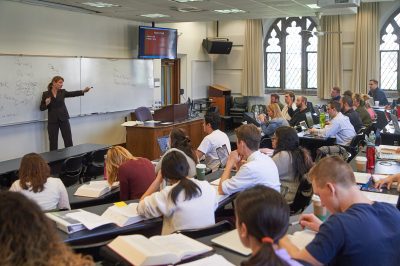Office of the Provost
Provost’s Office Monthly – September 2022
Message from the Interim Provost
As we move forward in the academic year, I’m finding that the work in the Provost’s Office largely falls in four main categories:
- Our annual and ongoing responsibilities around major academic processes, like PTR or budgeting for the schools, colleges, and library.
- Short- and medium-term projects/initiatives that we undertake to improve the quality of the work that we do at the University and that we typically finish within the year.
- Long-term projects, which are often highly collaborative and which we may or may not be leading ourselves. Examples of this are large building projects like Science 1 or supporting a school or college in starting a new academic program.
And, of course,
- Urgent situations, whether large or small scale – perhaps a student or faculty member with a pressing problem, or, in the past two years, managing the pandemic response.
At the moment, our office is focused on organizing and defining the second category at the moment – we are finalizing our inventory of current projects and plan to share a summary of them with you in the next newsletter. You can expect to hear more about these projects in the coming months, both through direct engagement and consultation, and via this newsletter. For example, you will read further down about the first Executive Leader Onboarding session, an initiative undertaken in partnership with several other University leaders and departments.
This connects to two other things I’ve learned about the work of the Provost’s Office. First, the work is highly collaborative, in ways that are both prescribed by our by-laws and policies and also an organic outgrowth of our institutional culture. There’s hardly a decision we make without extensive consultation and engagement across the university.
And, second – there’s no shortage of work to be done!
I’m so appreciative of the dedication and work ethic of everyone in the Provost’s Office, and their willingness to take on new projects whenever there’s an urgent need, regardless of how highly committed they are already. Please do always feel free to reach out with a concern or an idea – you’ll find willing listeners here.
All best,
![]()
Anne D’Alleva
Interim Provost & Executive Vice President for Academic Affairs
Academic Updates and Reminders
Mid-Term Resources & Reminders
The middle of the semester is always a good time to evaluate progress, whether it’s student performance in class or on our own work as faculty and staff. Engaging in formative feedback and submitting mid-term grades are important tools to support the success of our students.
Formative Feedback
Mid-term formative feedback surveys can be a useful tool for instructors to hear anonymously from their students on course materials, lectures, assessments, and other elements of course design. We encourage all instructors to implement a mid-term formative feedback survey in their courses. These surveys can be valuable resources to make mid-course adjustments, as well as to broaden student engagement.
The Center for Excellence in Teaching and Learning and the Office of Budget, Planning and Institutional Research offer resources to develop and distribute formative feedback surveys. In all cases, these are designed to be private (for instructors’ personal use only, not to be shared with department heads or other administrators). If you are interested in utilizing formative feedback, you can begin with a resource guide prepared by CETL.
Mid-Term Grades
Sharing mid-term grades with your students is another important part of reviewing student progress, which can have positive impacts on your students’ engagement in coursework. University Senate By-Laws state that by the end of the sixth week of the semester, instructors shall submit midterm grades for students in 1000- and 2000-level courses who have earned a grade of less than a C or U, or an N grade up to that point.
We encourage all instructors to share mid-term grades with their students in all levels. This feedback on progress will help students make adjustments and access resources as necessary to stay on track academically and assess their trajectory in the course to make decisions earlier on potential withdrawals or pass-fail designations in courses. This is also an opportunity to refer students of concern to academic support resources like the Academic Achievement Center (AAC).
We are sharing guides here with different options to submit grades to PeopleSoft. Informing your students of their grade or posting mid-term grades in HuskyCT is helpful but posting grades in PeopleSoft is necessary to ensure this information regarding student progress is available to staff at the University who provide academic support. Grades can be submitted beginning on Monday, October 3 through Thursday October 27. Instructors can submit grades three different ways into StudentAdmin:
- Manually into Student Admin utilizing these instructions
- Via an Excel file utilizing these instructions
- Via a direct feed from HuskyCT utilizing these instructions
For any instructors who have yet to administer any assessments in their course by which to determine a mid-term grade, now is a good time to administer an assessment to ensure you and your students know how they are progressing in the course and mastering the material.
Finals Opt-Out Reminder
Several years ago, the University Senate passed a by-law change regarding final assessments in all undergraduate classes. The change enabled all faculty and instructors in undergraduate courses to choose a variety of assessments of student work, stating that the final assessment does not necessarily need to be an exam. The change also eliminated the approval of the department and the dean of the school or college for faculty who choose not to offer a final examination.
If you are not delivering a final exam in Fall 2022, we ask that you fill out a brief form to notify the Registrar that you are opting out. We are asking for those who use another method of assessment (portfolios, projects, etc.) to let us know so that the room and/or time may be available for other instructors during the assessment period. It is also important that instructors recognize that due dates for these alternative forms of final assessment should not fall on days designated as reading days. As always, all due dates should be indicated on the syllabus at the beginning of the semester.
Many of our instructors have used other forms of assessment that align more purposefully with their intended learning objectives. Assessment formats can include individual or group-based strategies, e.g. projects, portfolios, papers, team-based work, creative works, performances, presentations, and other assessments in lieu of final exams.
Finally, please note that it is prohibited by Senate By-Laws to give your final assessments during the last week of classes. Exams during the last week of classes puts an undue strain on students who are trying to attend and participate in their other courses during that time.
Class Absences due to Illness
At this time of year, and considering the lasting effects of the COVID-19 pandemic, we would like to remind faculty that students are not required to provide “sick notes” or “medical excuses” when they miss classes, and such excuses should not be requested from them. More generally, per the university Senate By-laws, student grades should not be reduced because of a student’s absence. Please exercise flexibility and understanding for students who may miss class or classwork due to illness. Faculty should also exercise caution in attending class if they are feeling sick. Our community’s health and wellbeing remains a priority of the University. If any other COVID-related questions or issues arise during the remainder of the semester and academic year, you may find our COVID-19 FAQs for Academic Operations to be helpful, but as always, you are encouraged to reach out to our office directly at provost@uconn.edu if you would like additional support.
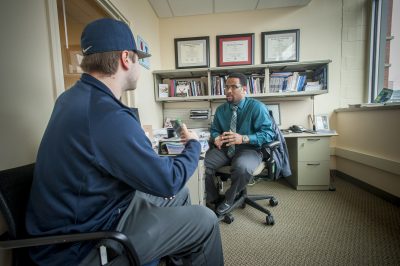
Faculty Office Hours
With the new academic year now under way and with our physical return to campus, we are writing with some general guidance to ensure that we are all providing the right kind of access to our students so that they receive the support they deserve throughout the semester.
As you know, faculty and staff who are student-facing are encouraged to be present and on campus. In the last two-and-a-half years, however, we have also seen how students have enthusiastically embraced alternative means through which to meet with their instructors and advisors, using the various virtual platforms we now have at our disposal.
We believe that a combination of in-person office hours and online availability is going to be the most effective way to maximize student access to their instructors. It is good practice to designate a minimum of 1-2 hours per week of regular in-person office hours, which can then be supplemented by online appointments as requested. Faculty play a critical role in student success by being available to students to answer their questions, offer guidance, and serve as mentors.
Pop-Up Classes
Following the success of pop-up courses on topics like anti-Black racism and the COVID-19 pandemic, UConn is offering two new pop-up courses this fall: Confronting Anti-Asian Racism and Climate Crisis: Take Action. Pop-up classes are taught online in a multidisciplinary and integrated fashion by faculty from various schools and colleges.
Interfolio Update
In the last newsletter, we announced that UConn has purchased Interfolio’s Review, Promotion, and Tenure module to digitize our PTR/PR workflows. On November 15th, our office will hold a virtual info session to share an introductory presentation to the community on the use of the module, give an overview of the implementation plan, and address common questions we have been receiving. If you are in any way involved in PTR/PR, we strongly encourage you to attend. See details on the info session.
News & Updates
Outreach & Engagement Inventory
The Office of Outreach & Engagement has begun collecting information about ongoing outreach and community engagement projects led by the University community. The objective of this project is to create a centralized database of activities that can be used to broaden participation and make more public the work that is already being done within UConn. You may submit information at the Outreach and Engagement form. Contact Rosa Raudales, Director of Outreach and Engagement, with any questions.
Husky Book Bundle
We are excited to announce a partnership with Barnes & Noble Education (BNC) to introduce a new course material model, Husky Book Bundle, which will reduce the cost of materials for full-time undergraduate students and ensure they have the required textbooks and supplemental material for all courses before the first day of class. This model will be in place for the Spring 2023 Semester.
The Husky Book Bundle Program is an inclusive access textbook savings program that delivers student course materials at a reduced price. This model is easy and convenient for student use, provides an affordable rental option, and supports student success by ensuring every participating student is prepared for the first day of class.
Husky Book Bundle makes getting textbooks easier for students. Benefits include:
- Students have their required materials on the first day of class and rent all their course materials from the UConn Bookstore for a flat fee of $285 per semester
- Students save 35–50% on the cost of course materials each term
- The flat fee will be included as a charge on their University Fee Bill
- Students can use their financial aid to apply towards course materials costs
- With immediate access to required materials, textbooks, and courseware, the barrier to student success will be removed including meeting accommodation needs for students with accessibility needs.
- Students will have the choice to opt-out of the program and have the charge removed from their fee bill.
- The bookstore will provide each student with a convenient package of required physical books, and digital materials directly delivered to the LMS (Husky CT) before the first day of class.
In late September, the UConn Bookstore will make announcements about the Husky Book Bundle Program to students. Faculty can contribute to the success of the program by submitting course material selections to the bookstore by the adoption deadline.
First Executive Leader Onboarding Session
UConn has launched a new Executive Leader Onboarding program to provide information and guidance to support executives as they take on leadership roles at the University. The first session was held on August 31st and included individuals who have taken on an executive or senior leadership role in the past two years.
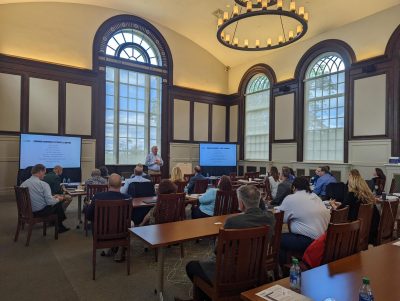
The Executive Leaders program involves a series of in-person and virtual onboarding sessions designed to:
- Describe UConn’s organizational, operational, and political context as Connecticut’s public flagship institution
- Facilitate a peer network of new executives
- Inform about current system-wide goals and initiatives
- Present UConn’s diversity, equity, and inclusion history, status, and aspirations
- Identify and introduce key personnel important for new senior or executive leader success
- Help leaders understand how decision making occurs at the institutional level, including who influences it and where the centers of (informal and formal) power resides
- Provide a resource for discussing new executive driven questions
Topics addressed include, but are not limited to:
- Organizational Structures -- How is UConn Organized and Why?
- Governance Structure (BOT, Faculty Governance)
- Government Relations (Dos and Don’ts)
- Communications (Dos and Don’ts)
- Diversity, Equity, and Inclusion -- Supporting the vision
- Policy Development and Compliance Issues at UConn
- Human Resources: practices, resources, and understanding union relationships
Read more about the Executive Leader Onboarding program on the Human Resource website.
Dean of the School of Nursing Search
As many of you may know, Dean Deborah Chyun of the School of Nursing plans to retire from the University at the end of the 2022-23 academic year. Dean Chyun has served as dean for the past five years and has led the school through unprecedented growth in enrollment, responded with agility to the COVID-19 pandemic and its impact on the nursing profession and educational experience, and maintained the quality and rankings of nursing programs at UConn. The Office of the Provost will undertake a national search to identify candidates to lead the School of Nursing, to be chaired by Jason Irizarry, Dean of the Neag School of Education and Professor of Curriculum and Instruction.
Waterbury Campus Director Search
The search for the next Director of the UConn Waterbury Campus continues with second round, on-campus interviews happening the week of September 26-30. Each candidate will give a virtual public presentation, where they will present briefly on their vision and qualifications to lead the Waterbury campus. Read more information on public presentations, candidate details, and about the search in general.
Health & Wellness Reminders
Student Health and Wellness (SHaW) continues to provide resources for our students’ overall health and wellness. With the emergence of new illnesses such as monkeypox, please remind students that SHaW is available and ready to help. All eligible UConn Students are able to be vaccinated for monkeypox in Connecticut. Learn more about monkeypox vaccination at the Connecticut Department of Public Health website. Storrs-based students who want to be vaccinated by SHaW can contact 860-486-2719 to see if they are eligible. For more information on student protection against monkeypox, refer to the SHaW’s Monkeypox webpage.
SHaW also continues to provide up-to-date COVID-19 information and resources for UConn students at SHaW COVID-19 Website.
As a reminder, information regarding the university’s COVID-19 guidance can be found at covid.uconn.edu
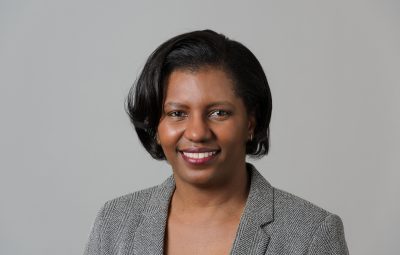
Academic Affairs Spotlight
The Office of the Provost and the units that report in academic affairs are staffed and led by an outstanding group of talented and dedicated colleagues. This month we are spotlighting Gladis Kersaint, Vice Provost for Strategic Initiatives.
Gladis has served as vice provost at UConn since March of 2021. Prior to joining the Provost Office, Gladis served as dean and professor of mathematics education at the Neag School of Education. She is a well-respected scholar with an extensive publication and national service record. She has led a number of collaborative STEM education projects involving school district personnel as well as university faculty in the arts and sciences and in engineering. She has also provided service at the national level, including having served as a member of the Board of Directors for the National Council of Teachers of Mathematics, the largest professional organization for mathematics educators, and the Association of Mathematics Teacher Educators. Gladis currently serves on the American Association of Colleges for Teacher Education (AACTE)’s Board of Directors.
What does a typical work week look like for you?
Because of the nature of my Provost Office portfolio, each week can be quite different. However, a staple is that I am in quite a few meetings during the week. Because of the boundary-crossing nature of my role, the players with whom I am speaking can include leaders and staff members internal to and across the UConn and UConn Health. In addition, I collaborate with individuals external to the University (e.g., state department, industry, etc.).
What is an important project/initiative you’re working on right now?
I am working on several initiatives that have moved from last year’s development stage to implementation this year. First, I am excited about implementing the inaugural Executive Leader Onboarding program, a university-wide effort supported by the President’s Office to support the successful integration and effectiveness of new or recently hired senior leaders. Through a series of university-level onboarding opportunities, these new leaders, including those new to UConn or those hired from within UConn, will learn about all aspects of the UConn enterprise, including areas not directly related to their specific areas of role responsibility. In addition, current university leaders lead sessions to share information about their units and provide insights to support their colleague’s success.
I am also very proud to facilitate the faculty awards and honors work. UConn has outstanding faculty members doing fantastic work and achieving accolades for their accomplishments. However, we didn’t have a university-wide approach for showcasing and celebrating these accomplishments. That is no longer the case. Working with UConn and UConn Health units, we have developed a system for gathering information and showcasing Faculty Awards and Honors. We also plan to celebrate award winners moving forward and work with units to encourage faculty nominations for prestigious awards. Collectively, we enhance the University’s reputation by showcasing our faculty excellence.
I am looking forward to advancing my work in these and other areas. For example, we are already developing an online searchable database of faculty award and honors, which is an improvement over the word document currently posted on the website.
What are you most looking forward to as the academic year begin?
Because many of the tasks I worked on last year were in development, I am looking forward to further progress in several areas. For example, I chaired the Academic Integrity Taskforce to address a long-standing and unaddressed issue related to how UConn defines academic integrity and addresses student misconduct. I had the pleasure of working with a dedicated group of representatives from the University Senate, Graduate Faculty Council, Community Standards, The Graduate School, OVPR, Undergraduate Student Government, and Graduate Student Senate. I look forward to supporting efforts to move their recommendations forward, hoping for full adoption and implementation.
If you could solve one problem right now at UConn, what would it be?
I’m not sure if everyone would agree that this is a problem, but I often think about this as I engage in my work. How can we take a ONE UConn (i.e., a system-wide approach to benefit the greatest good in the University community, including faculty and staff from UConn and UConn Health)?
I would solve the problem of decreasing the inherent suspicion associated with using a ONE UConn approach. I believe it is possible to approach the work from this perspective while simultaneously honoring disciplinary differences and existing governance structures. For example, in my presentation to participants of the Executive Leaders Onboarding program, I framed “ONE UConn” as a philosophy, a goal, a practice, and a leadership approach that aims to improve outcomes, rather than hinder the activities of any specific unit. My view is that taking a ONE UConn approach broadens our perspective about what might be possible and encourages us to ask questions like the following: How does what I do impact other units, other schools/colleges, the University? Are other units doing this? Can we learn from or adopt strategies used by other units? Is it okay for one unit to do this but not another? Does our decisions promote equity? How might we expand possibilities if we all decided to use this approach? How do we minimize inequity and increase (personal and community) accountability by using such an approach? What are the implications and consequences of this approach?
I acknowledge that a ONE UConn approach may not work in every circumstance. However, asking questions from a ONE UConn perspective might lead us to enhance how we do what we do in ways that are thoughtful, meaningful, equitable, and inclusive.
Important Dates, Deadlines, and Events
Important Dates
September 26-27 - Rosh Hashanah
September 26-29 - Waterbury Director Candidate Public Presentations
October 5 - Yom Kippur
October 10 - Indigenous People’s Day
October 11 - Sukkot
October 27 - Midterm Grades Due
Provost Office Awards
The Provost Office facilitates the following awards: Board of Trustees Distinguished Professor Award, Provost’s Outstanding Service Award, Provost’s Award for Excellence in Community Engaged Scholarship, and Alumni Faculty Excellence Awards.
Nominations for these awards are now open. Visit our website for details on nomination materials, deadlines, and past winners.
Emeritus Status Nomination Deadline
For individuals who do not meet the conditions for automatic Emeritus status (1. rank of Associate Professor or full professor or equivalent titles for clinical, in-residence and extension (CIRE) at University of Connecticut, and 2. at least five years of service) may become emeriti by vote of the Board of Trustees or the Health Center Board of Directors following recommendation of the Emeritus Committee and the President. The Committee meets twice yearly to consider cases. The next deadline to submit materials to the Committee is November 1.
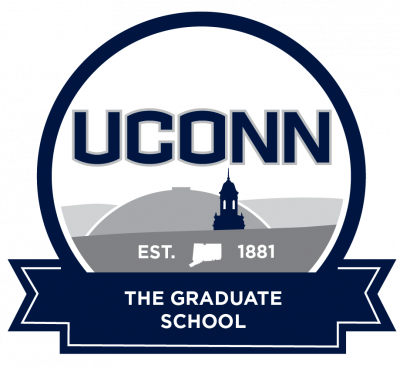
Timely Topics
Timely Topics, hosted by The Graduate School, is a series of opportunities to engage with subject matter experts on topics relevant to those who support and advise graduate students and programs.
Every session is available to all UConn faculty and staff and provides information and tools that will help you best support your students and program. View the fall 2022 schedule.
